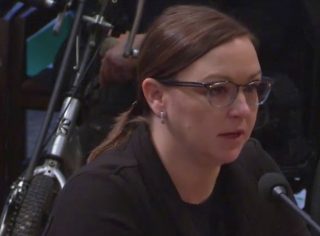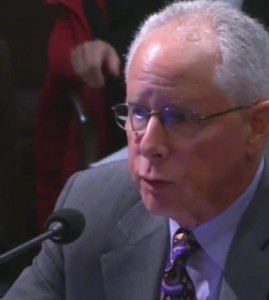
offered conditional support.
(Photos from City Council live feed)
Advocates of a 10-cent local gas tax joined up to form quite a list of endorsers Wednesday for a midafternoon hearing at Portland City Council. Council heard a presentation and testimony about the idea ahead of adopting a resolution to send the tax to the ballot.
“I feel like a possum on I-5 during rush hour right now,” said Paul Romain, a lobbyist for Oregon gas retailers who was one of only two people to speak clearly against the measure.
Offering support was everyone from a freight advocate to a business advocate to an environmental justice advocate from East Portland to a frequent City Hall testifier who goes by the name of “Lightning.” While almost everyone seemed to like the idea, a close look at their testimony reveals mixed feelings that could offer clues to future debates.
“It’s not every day that we have a panel that has the diversity of views that have come in before us,” said Commissioner Nick Fish, who cast one of the council’s five unanimous votes in favor of sending the $16 million annual tax to Portland voters on the May 17 ballot.
“We want to make sure that vehicle road capacity is not impacted as a part of this.”
— Molly Haynes, Portland Business Alliance
Transportation Commissioner Steve Novick, whose office pulled the various interests to agree on this concept over the last year, was another of the five votes. He said the city estimated that 54 percent of the revenue would go toward projects mostly associated with road maintenance and 46 percent toward projects mostly associated with road safety.
Here’s the list of people who testified in favor Wednesday (as well as I’ve been able to assemble it):
Fiona Yau-Luu, Oregon Walks
Kari Schlosshauer, Safe Routes to School National Partnership
Kristi Finney-Dunn, Families for Safe Streets
Mychal Tetteh, Community Cycling Center
Marion Haynes, Portland Business Alliance
Andy Shaw, City Club of Portland
Leah Benson, Gladys Bikes
Rebecca Hamilton, Pedestrian Advisory Committee
Gerik Kransky, Bicycle Transportation Alliance
Chris Smith, Portland Planning Commission
Matthew Mičetić, Red Castle Games
Amy Subach, Vision Zero USA
Ophelia Miracle, Grant High School student
Vivian Satterfield, OPAL Environmental Justice Oregon
Corky Collier, Columbia Corridor Association
Chris Rall, Transportation for America
Ruthann Bennett, Professional and Technical Employees Local 17 (city workers)
Charles Johnson, Oregonians for Food and Shelter and Compassionate Wisdom
Chau Phan Mende, parent of student at Robert Gray Middle School
Kem Marks, East Portland resident
Hau Hagedorn, North Portland resident
Craig Rogers
Here’s a list of people who opposed it:
Paul Romain, Oregon Fuel Association
Terry Parker, Northeast Portland resident
Many of those who said they were in favor offered conditions. For example, Mychal Tetteh, executive director of the Community Cycling Center, was one of several who said he was taking the city at its word that it would spend the next four years working on a more progressive way to pay for streets.
“The regressive nature of the mechanism adds to a long list of transportation fees and taxes and fails to protect our lower-income households from higher transportation costs, much less divides the revenue more fairly between residents and businesses. Thankfully, the projects listed in the proposal steer revenue to the areas of the city that have long been neglected and unsafe. However, these projects alone do not solve the existing structural challenges either in the way the Bureau of Transportation allocates existing funds or determines overall transportation policies. During the regressive nature of the temporary tax on gas, our support of this effort is conditioned on the city and PBOT’s commitment to identify and pursue less regressive future funding sources and an ongoing commitment to increase transportation improvements in our most dangerous neighborhoods.”
Advertisement
Collier, the freight lobbyist, sounded similar notes of support but added that $16 million a year is very little compared to the $100 million a year cost of fully preserving every street in the city, plus the unknown cost of eliminating traffic fatalities and serious injuries. Collier noted that if Oregon’s 1919 gas tax had been adjusted for inflation, it would now be at 70 cents per gallon, not the 30 cents people pay today.
“We have a lot more expensive road system than we did in 1919, but we’re only spending half as much to maintain it. If we could get away with it, that would be something to be proud of, but we haven’t been getting away with it. It’s deteriorating and it’s going to cost us a lot more in the future. … This is just the beginning. This is a drop in the bucket for how much we’re going to have to come up with in the future. … A few years ago, a gas tax was an obvious good solution. But that was before the arts tax, the library bond, the school bond and a number of measures that have weighed more heavily on the poor.”
Haynes, of the Portland Business Alliance, said her group saw a lot to like about gas taxes:
“It’s user-based, it’s very low in its overhead, we appreciate the voter approval that the gas tax requires, and the gas tax couldn’t be diverted to other uses. So we know that it’s going to go to its intended purpose of the maintenance issues and the safety issues.”
Haynes also said that in addition to the deferred maintenance problems the group has focused on, “there are also pressing safety needs on the streets that need to be addressed.” But she said the group would only support improvements to those “pressing safety needs” on one condition.
“We want to make sure that vehicle road capacity is not impacted as a part of this,” she said. “We really think the focus needs to be on those critical safety improvements and also on the maintenance backlog.”
Haynes also seemed to call for future taxes or fees on people who don’t drive cars. “We would not like to see additional taxes and fees on this same user group during the period, recognizing that there may be others out there that aren’t contributing at this point,” she said.
Kristi Finney-Dunn testified on behalf of Oregon and Southwest Washington Families for Safe Streets, the advocacy group whose members have seen loved ones die or suffer life-changing injuries on streets. “It is imperative that measures be taken to improve safety on our streets as soon as possible,” she said. “We cannot stress enough the urgency that we feel on this matter … We don’t want any more people to qualify for our Families for Safe Streets group.”

Fuels Association has killed past attempts
to raise road use fees, and he’s not
happy about this one either.
Romain, the fuel retail lobbyist, warned that “there will be a very broad coalition of people opposing this at the ballot.” (You might recall that it was Romain whose opposition tanked former Mayor Sam Adams’ “Safe Sound and Green” effort in 2008.)
“This is a bad idea,” he said, observing that some people will choose to fill up their cars at stations outside Portland’s borders. “We can go up a lot with the state gas tax, we just have a hard time with a local gas tax.”
Romain said his allies would mount a legal challenge to the text of the city’s ballot measure to reflect that (although the state constitution requires that it be spent on roads) the money might not be spent on the projects the city currently plans.
“Anybody in the audience who thinks those projects are sacrosanct is wrong,” Romain said. “They can be changed at any time.”
Asked by Fish and Mayor Charlie Hales what alternative measures his members would support, Romain mentioned the statewide gas tax and a proposal by Clackamas County to raise annual auto registration fees by $25 per year.
If this tax passes, we could have a very interesting summer here in Portland. Just as the City makes driving more expensive, Portlanders will see 1,000 bike share bikes hit the street. If both programs work as advertised, it could be a strong one-two punch from transportation reformers.
If you missed the hearing, you can watch it here.
— Michael Andersen, (503) 333-7824 – michael@bikeportland.org
BikePortland can’t survive without paid subscribers. Please sign up today.


